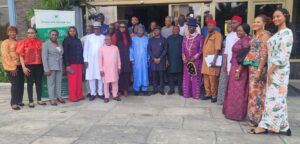Determined to ensure the effective delivery of natural resource benefits to host communities in accordance with the provisions of the Petroleum Industry Act (PIA), Spaces for Change | S4C and the Federal House of Representatives’ Committee on Host Communities, with support from the Ford Foundation, co-hosted a two-day technical session in Port Harcourt, Rivers State, focusing on the implementation of the Host Community Development Trusts (HCDTs). Chapter 3 of PIA obligates licensees of petroleum activities to establish HCDTs as a vehicle for delivering direct social and economic benefits from natural resources to the host communities, and also bolster a peaceful and harmonious coexistence between corporations and communities that host their petroleum operations.
Spurred by the outcomes of S4C’s National Extractives Dialogue (NED2023), the technical session held on November 29-30, brought together 54 stakeholders in the oil and gas industry comprising members of the House Committee on Host Communities led by Rt Hon. Dumnamene Dekor, representatives of indigenous and international oil companies (Shell, BP, Chevron, and Seplat Energy), industry regulators (Nigerian Upstream Stream Petroleum Regulatory Commission (NUPRC), Nigerian Midstream and Downstream Petroleum Regulatory Authority(NMDPRA), Hydrocarbon Pollution Remediation Project (HYPREP), and the National Human Rights Commission (NHRC)); members of HCDTs, traditional rulers, civil society organizations, and the media.
On the first day, the lawmakers gained deep insights into the provisions of the PIA and HCDTs, the global trends in the energy industry, and the outcomes of NED2023 especially host communities’ expectations and challenges arising from the implementation of HCDTs. Oral and written testimonies from the representatives of the Board of Trustees of HCDTs already set up in Imo, Bayelsa, Akwa Ibom, and Rivers States provided real-life contexts for evaluating the performance of both companies and the regulators. Concerns of communities revolve around the imposition of unpopular nominees on communities, lack of meaningful consultation and engagement, clustering unwilling communities together under the same trust, under-representation of women and youth, unemployment of local youth, exclusion of indigenes in the so-called companies’ legacy projects and poor representation of communities by their traditional rulers. The perspectives shared by communities uniquely positioned the federal lawmakers to assess the implementation of the HCDTs by industry regulators and corporations consistent with their statutory monitoring and oversight responsibility for effective policy implementation of the PIA.
Regulators—NUPRC and NMDPRA—gave detailed accounts of the steps they have taken to ensure the implementation of the HCDTs. About 82 HCDTs have been successfully incorporated at the Corporate Affairs Commission (CAC) out of the 120 HCDT applications received from 35 settlors (oil and gas companies) as of November 2023. Based on the testimonies of both the host community representatives and the industry regulators, a major challenge slowing down implementation is the recurrent disputes arising from the calculation of 3% operational expenditure of oil firms accruable to host communities coupled with the floodgate of petitions and litigation contesting nominations into various bodies of the HCDTs. The NUPRC has established an Alternative Dispute Resolution (ADR) Centre in Bayelsa State to handle these issues.
The second day of the technical session featured testimonies and presentations by oil companies, rendering an account of their transition from an era of executing benevolent Global Memorandum of Understanding (GMOUs) with host communities to the establishment of the HCDTs. The transition from GMOUs to HCDTs has been a learning curve for petroleum corporations, riddled with important lessons and tough challenges. On the positive side, corporations have successfully trained their personnel, engaged their host communities and regulators screened nominees for appointment into the HCDTs, applied to the NUPRC for the necessary approvals, set up the trusts, opened bank accounts for the trusts in different currencies and funded some of the accounts. Some have scheduled planning meetings for the needs assessment exercises, and developed a funding matrix taking into cognizance the land acquisition, oil production, and the nature of hosted assets. Companies like SEPLAT retained certain practices that favor communities where project sites are located such as the retention of the Freedom to Operate payouts even though this is not expressly provided by law.
Challenges they have faced include disagreements over the choice of nominees and bank accounts, the role of traditional rulers, protests and disruption of operations, intra- and inter-community conflicts, littoral states not yet delineated by the regulator, litigation, etc. Other challenges relate to the undefined roles for traditional institutions, resistance from some community groups, delays in the kickoff of the trusts in some areas, and the insufficiency of 5% administrative funding reserved for the Management Committees, which may necessitate recourse to the Reserve Fund.
Some of the numerous challenges were rooted in gaps in the PIA, prompting calls for amendment of certain sections of the Act. Examples of sections recommended for amendment include those vesting enormous powers on settlors to determine their host communities and appoint members of the Board of Trustees; sections placing responsibility on communities to safeguard oil facilities within their domains; the need to inject clarity into the calculation of 3% opex accruable to host communities and the imperative for environmental accountability as a precondition for divestment. Announcing the Committee’s commitment to addressing gaps in the PIA through amendments where necessary, the Chair of the Committee reiterated that the highlighted challenges would be carefully examined and solutions proffered.
The technical session wrapped up with targeted advisory and recommendations by federal agencies such as the National Human Rights Commission, Hydrocarbon Pollution Remediation Project (HYPREP), and civil society organizations. The two-day event served as a robust platform for addressing challenges and setting the stage for future legislative interventions to enhance the effectiveness of the PIA in benefiting host communities. The collaboration between S4C and the House Committee on Host Communities underscores a commitment to fostering positive change in the implementation of HCDTs for the betterment of host communities nationwide.




